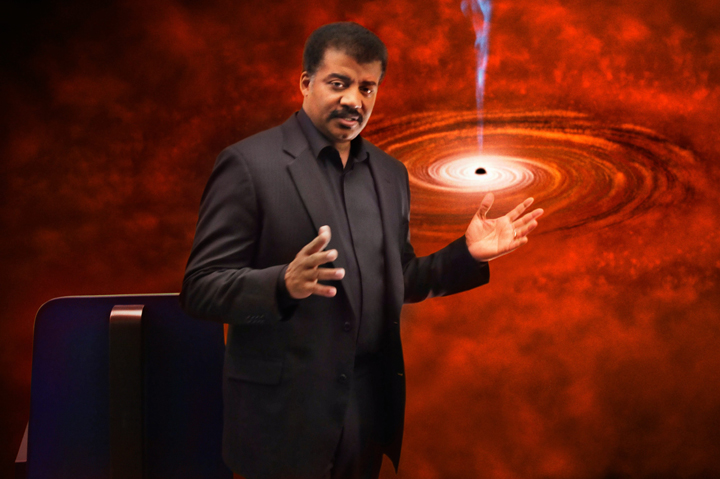Neil deGrasse Tyson, the face of National Geographic’s StarTalk and the impassioned purveyor of all things science, still doesn’t think Pluto is a planet.

In the debate over the “demotion” of what was once considered the ninth planet of our solar system, he is often touted as the first to have put the nail in planet-Pluto’s coffin when, as head of the Hayden Planetarium in New York City, he moved the small world out of the model of the solar system and instead put it in its own area of icy objects.
“I was just being a realist,” he told Global News by telephone on Monday. And he’s unapologetic, even with the recent release of high-resolution images of the surface of Pluto which reveal a world far more complicated than astronomers and planetary scientists had ever envisioned.
WATCH: NASA reveals new close-up, super-high resolution images of Pluto
“The current definitions for what makes a planet versus a dwarf planet, remain completely applicable for Pluto in the face of all that’s been discovered about it,” he said.
That being said, he’s still excited about gleaning more knowledge about a unique world we’re only just beginning to understand.
“Pluto is telling us that it has an active interior, in some way, that we don’t yet understand. And the most fun things are the things we understand the least about.”
Along with Bill Nye “The Science Guy” (a close friend), Tyson has been at the forefront of promoting scientific literacy. His deep voice, infectious enthusiasm about science and the ease with which he translates the scientific into easily understandable and fascinating facts, made him a perfect choice for the reinvention of Cosmos: A Spacetime Odyssey that aired last year, originally hosted by Carl Sagan in 1980.
Tyson also has the added benefit of using social media for his “scientific droppings” as he calls them, being able to reach far more people — with 4.63 million followers on Twitter alone — than Sagan could ever have. And he doesn’t hold back, even on topics such as gun violence and politics.
What’s out there?

Get breaking National news
When asked about getting answers about our universe, Tyson is philosophical.
“The question I have that I want answered is the question I don’t know yet to ask, because it would only be manifest to me after the next discovery was made,” he said.
He explained: “Think about it: so the very statement, ‘What kind of rocket do you need to go to Mars?’ is an unthinkable question before the rocket is even invented. I look forward to learning what questions we have yet to even know to ask.”
But the straight, more understandable answer is less complicated.
“I want to know what was around before the Big Bang; I want to know is there a multiverse, where we’re just one of an infinite number of other universes; I want to know how you make life from organic molecules — inanimate organic molecules — to animated life; I want to know how to transition that. Earth did it relatively quickly long ago. I want to know the nature of dark matter and dark energy; I want to know if there’s life elsewhere in the universe, especially if that life is what we’d call intelligent, especially if that life is so intelligent that they would not rate us as such.”
The public and science
Tyson feels that the world is far more scientifically literate than it once was, citing widely successful movies like Gravity, Interstellar and The Martian, to name a few.
“I think there are more scientifically literate people today than ever before. The problem is they’re not the ones in charge. So we need to focus bringing people in charge to a level of science literacy so they can make informed decisions in the interest of our health, our wealth and our security,” he said. “In the absence of that, it’s kind of a recipe for disaster.”
“The problem is being scientifically illiterate but thinking that you are. That’s a combustible combination.”
Though there has been a drive to interest future generations in science with the influx of science, technology, engineering and math (STEM) programs in educational programs from elementary schools to universities, Tyson feels the onus is on the current generation to step up and become better educated about the world around them.
“I’m too impatient: I’m not going to wait for the middle-schooler who’s benefiting from a STEM program to interest them in science,” he said. “I’m not going to wait 30 years for them to become president. No, I’m too impatient for that. We need to fix the grownups.”
Tyson’s geekdom isn’t reserved for just the science. He’ll often address the fun — like which science fiction ship would win in a battle (Star Wars fans won’t be happy).
As for continuing spreading the word of science, Tyson shows no signs of slowing down: StarTalk airs on National Geographic every Monday and Cosmos may return later this year (“We should know in a couple of months.”). He’s also on a tour — “An Evening with Neil deGrasse Tyson” — beginning in January, with his only Canadian stop in Toronto on Feb. 24.
Tyson’s excited about how people are making science an important part of their lives.
“I’m tickled by the public’s reaction,” he said. “I think they’re embracing it in a way that they realize that science isn’t just cool to know, it’s something important to know, for the health an wealth and security of civilization.”








Comments